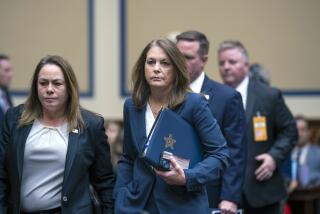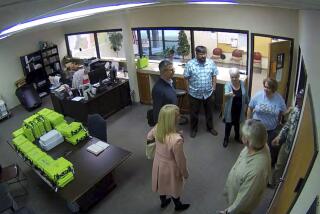Hall Says North Acted Only With Superiors’ Approval
- Share via
WASHINGTON — Fawn Hall, former secretary to National Security Council official Oliver L. North, told congressional investigators Tuesday that her former boss characteristically acted only with approval from his superiors and that depictions of him as a “rogue elephant” are wrong.
Hall’s second and final day of testimony before the House and Senate committees investigating the Iran- contra scandal renewed speculation about whether high-ranking White House officials sanctioned North’s possibly illegal activities.
Those activities--which strayed far from the normal advisory role of the National Security Council--included coordinating military operations for Nicaragua’s rebels and helping to raise funds for their cause when U.S. government aid was banned.
Hall, who worked for North for four years until he was fired last November, added her own assessment to the confusing and often conflicting views of North’s character that have emerged in the six weeks of hearings.
Opinions have ranged from Secretary of State George P. Shultz’s reported characterization of North as a “loose cannon” to be monitored closely, to Hall’s description of North as a well-disciplined Marine adept at handling severe crises with a cool head.
Despite these contradictions, witnesses unanimously have described North as “someone who would get things done . . . the kind of person Ronald Reagan obviously wanted in that job,” Sen. William S. Cohen (R-Me.) said in an interview.
North was “creative in his work,” Hall said, but insisted she did not believe “he would do anything without authorization.” He was “not a rogue elephant,” she added.
Getting permission to act, Hall suggested, may even have extended to destroying a 1 1/2-foot-tall stack of memoranda, internal communications and telephone logs in a “shredding party” in North’s office last Nov. 21, shortly after an internal White House investigation of the Iran-contra affair began.
“I don’t know that it was unauthorized,” Hall corrected, when Rep. Thomas S. Foley (D-Wash.) referred to “that unauthorized destruction of documents.”
She also said the shredding was done in “a very relaxed atmosphere. . . . It certainly wasn’t lock the door, close the windows and pull down the shades.”
Several Clashes
In one of several instances in which Hall clashed with a committee member, she also vigorously denied a suggestion that the shredding of the documents, which apparently detailed the Iran arms sale plan and aid being given to the contras, had been “a cover-up.”
“I don’t use the word cover-up, I would use the word protect, “ Hall said. “I just felt that there would be a lot of damage done if a lot of top-secret, sensitive, classified material was exposed in public so that the Soviets, everyone else could read it.”
“Well, it wasn’t the KGB that was coming, Miss Hall. It was the FBI,” retorted Sen. Warren B. Rudman (R-N.H.), vice chairman of the Senate panel.
After Hall’s testimony, Rudman said, he “never believed that Col. North acted alone, acted without direction.” But he added that the investigators will not know the source of that direction--particularly, whether President Reagan was involved--until they hear from North. Reagan has denied any knowledge of any illegal efforts to aid the contras.
Limited Immunity
The committees voted last week to offer limited immunity to North as a means of compelling his testimony. He is expected to appear before the committees next month.
Hall’s testimony did not make clear whether North knew that investigators were closing in on him when he destroyed the potentially important evidence of his activities.
“Something happened that day that stirred up the hormones as far as Col. North (was) concerned, to want to get rid of some documents,” Rep. Dante B. Fascell (D-Fla.) noted. “What do you think it was?”
“I don’t know why it happened,” she replied. “I don’t know what triggered it; I don’t know what the motives were.”
Role of Attorney
Much of the questioning also centered on the role of Thomas C. Green, a Washington attorney who briefly represented North and who appeared before the committees weeks ago alongside former Air Force Maj. Gen. Richard V. Secord, his client and another central figure in the Iran-contra affair.
Hall testified that on the day investigators were sealing evidence in North’s office, Green encouraged her to mislead investigators about the shredding and accompanied her and North without objection as she smuggled documents from the White House complex. The documents were hidden under her clothing.
Tuesday, Earl J. Silbert, Green’s attorney, issued a statement saying that Green “knew nothing about removal of papers from the White House until he witnessed a transfer of some papers in his car” from Hall to North. “Also, as of that evening, Mr. Green had no information at all about any shredding of documents.”
“Immediately after Col. North and Miss Hall left his car, he drove to his partner’s home in Maryland, explained his shock at what occurred and made arrangements to withdraw from representation of Col. North that evening,” Silbert added.
He contended that Green’s actions “were completely appropriate and in full accord with the Code of Professional Responsibility that governs the conduct of lawyers.”
The committees will not meet again in public for more than a week. In the meantime, they plan to take depositions from four or five CIA officials, Sen. David L. Boren (D-Okla.) said.
Until North goes before the committees, Hall’s testimony is likely to be the most authoritative public account of how North spent his time at work. She said the White House had given “an accurate description” of North’s contact with the President when it released records indicating that North never met alone with Reagan and attended 19 meetings with him at which there were never fewer than five people present.
Two Telephone Calls
According to the White House account, Reagan and North also had two telephone calls--one a conference call with several other people and the other several hours after North was fired. Hall earlier had quoted North as saying in that second call that the President indicated he had not been aware of the aide’s activities.
Usually, Hall said, North cleared his ideas with the national security adviser. During the years in which the Iran-contra affair was unfolding, that post was held first by Robert C. McFarlane and then by Vice Adm. John M. Poindexter.
Poindexter, who is also scheduled to testify next month under limited immunity, resigned Nov. 25, the same day North was fired. It was also the day that Atty. Gen. Edwin Meese III disclosed that profits from the secret sale of U.S. arms to Iran had been diverted to the contras.
Hall testified that she could not recall any of North’s proposals being turned down, but other evidence produced earlier showed several instances in which North’s superiors steered him away from proposals that they said might violate the ban on aid to the contras.
North’s former secretary, who now works at the Pentagon, said that North was “probably walking a fine line. . . . I don’t think he would cross that line” and break the law.
Hall noted that North was especially close to the late CIA Director William J. Casey, but said she did not know if North took orders from him, as McFarlane had speculated in earlier testimony before the committees.
The testimony from the fiercely loyal Hall portrayed North in marked contrast with some earlier descriptions heard by the committees, but tracked closely with others.
Assistant Secretary of State Elliott Abrams had told the panels last week that Shultz considered North “a loose cannon,” and had ordered Abrams to watch him closely.
Abrams, however, said he believed the aide generally checked his actions with his superiors. Abrams added that North repeatedly denied any wrongdoing.
Hall’s loyalty to North sparked several confrontations with committee members, including a particularly angry exchange with Cohen in which she disagreed with the senator on whether North deserved a grant of immunity from the committees.
“He has the same rights that you yourself do, sir,” Hall snapped.
“I don’t think anybody’s entitled to immunity,” Cohen said. “If he would not engage in any wrongdoing, Miss Hall, then we wouldn’t have to be involved with the question of immunity at all.”
“Then we have our separate opinions, sir,” Hall said.
Committee members also disagreed with Hall’s own portrayal of herself as a mere typist who rarely took note of the content of the documents she typed. That, they said, conflicted with her expressions of sympathy with the contras.
“How did you pick up this strong feeling of supporting the contras if you never read anything you typed, and you never discussed it with (North)?” Sen. Sam Nunn (D-Ga.) asked.
“It’s very easy if you read, skim things,” she said. “After four years, you’re bound to pick up a feeling.”
More to Read
Sign up for Essential California
The most important California stories and recommendations in your inbox every morning.
You may occasionally receive promotional content from the Los Angeles Times.













